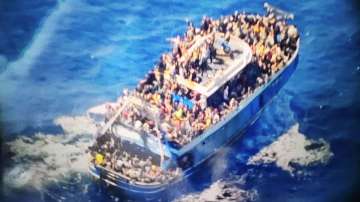Greece boat disaster: UN body says 500 people still missing as 'overcrowded' fishing vessel capsized
So far, 79 bodies have been recovered and 104 people have been rescued. It was unclear how many were missing, but some initial reports suggested hundreds may have been aboard.

The United Nations Migration body has claimed more than 500 people are still untraceable even after 72 hours of launching a massive search operation for an overcrowded ship that went off Greece's south coast on Wednesday.
Alarm Phone, a network of activists who run a hotline for migrant boats in distress, said they had been in contact with people they believe were on the same vessel and who were desperate for help. The passengers reported that the captain had abandoned the ship on a small boat before it capsized, Alarm Phone said.
What happened?
Greek coast guard, navy and merchant vessels and aircraft launched a vast search and rescue operation after the overcrowded fishing boat capsized and sank early Wednesday some 75 kilometres southwest of the southern Peloponnese peninsula. So far, 79 bodies have been recovered and 104 people have been rescued. It was unclear how many were missing, but some initial reports suggested hundreds may have been aboard. If that is confirmed, the wreck could become the deadliest so far this year.
Vast search operation
Patrol boats and a helicopter spent a third day scouring the area of the Mediterranean Sea where the packed fishing vessel capsized early Wednesday, in what the U.N. migration agency said could be the second deadliest migrant shipwreck recorded. The deadliest occurred when a vessel capsized off the coast of Libya en route to Italy in April 2015, killing an estimated 1,100 people.
Greek coast guard spokesman Nikos Alexiou said that both coast guard and private ships repeatedly offered by radio and loudspeaker to help the vessel Wednesday while it was in international waters, also heading from Libya to Italy, but they were rejected.
Patrol boats and a helicopter spent a third day scouring the area of the Mediterranean Sea where the packed fishing vessel capsized early Wednesday, in what the UN migration agency said could be the second deadliest migrant shipwreck recorded. The deadliest occurred when a vessel capsized off the coast of Libya en route to Italy in April 2015, killing an estimated 1,100 people.
Greece offered assistance: Official
Greek coast guard spokesman Nikos Alexiou said that both coast guard and private ships repeatedly offered by radio and loudspeaker to help the vessel Wednesday while it was in international waters, also heading from Libya to Italy, but they were rejected. Alexiou argued that any effort to tow the overcrowded trawler or move hundreds of unwilling people onto nearby ships would have been too dangerous.
“You will have a disturbance, and the people will surge — which, unfortunately, is what happened in the end,” Alexiou told state-run ERT TV. “You will have caused the accident.”
Alexiou also said that, after accepting food from a merchant ship, the trawler’s passengers rejected a rope bringing more from a second merchant ship “because they thought the whole process was a way for us to take them to Greece.”
Greek authorities sent the first ship, the tanker Lucky Sailor, to give the migrants food and water. The company managing the tanker said Friday that the people on board “were very hesitant to receive any assistance, and at any attempt of approach the boat started to manoeuvre away.” Eastern Mediterranean Maritime Limited said in a statement that the people on the trawler were eventually persuaded to accept supplies.
What UN body says?
Flavio Di Giacomo of the Mediterranean office of the U.N. migration agency IOM tweeted that all migrant boats should be considered dangerous and rescued immediately because “even when they appear to have no problems, in a few minutes they can sink.”
Rescuers pulled 104 survivors from the water and later recovered 78 bodies but have not located any more since late Wednesday. The Greek coast guard said the search-and-rescue operation would continue beyond the standard 72 hours.
The UN’s migration and refugee agencies issued a joint statement calling timely maritime search and rescue “a legal and humanitarian imperative” and calling for “urgent and decisive action to prevent further deaths at sea.”
A group of nongovernmental organizations, including Amnesty International and Doctors Without Borders, said the EU should “stop seeing solutions solely in the dismantling” of smuggling networks, and set up state-led search-and-rescue operations in the Mediterranean.
“The Greek government had specific responsibilities toward every passenger on the vessel, which was clearly in distress,” Adriana Tidona of Amnesty International said. “This is a tragedy of unimaginable proportions, all the more so because it was entirely preventable.”
(With inputs from agency)